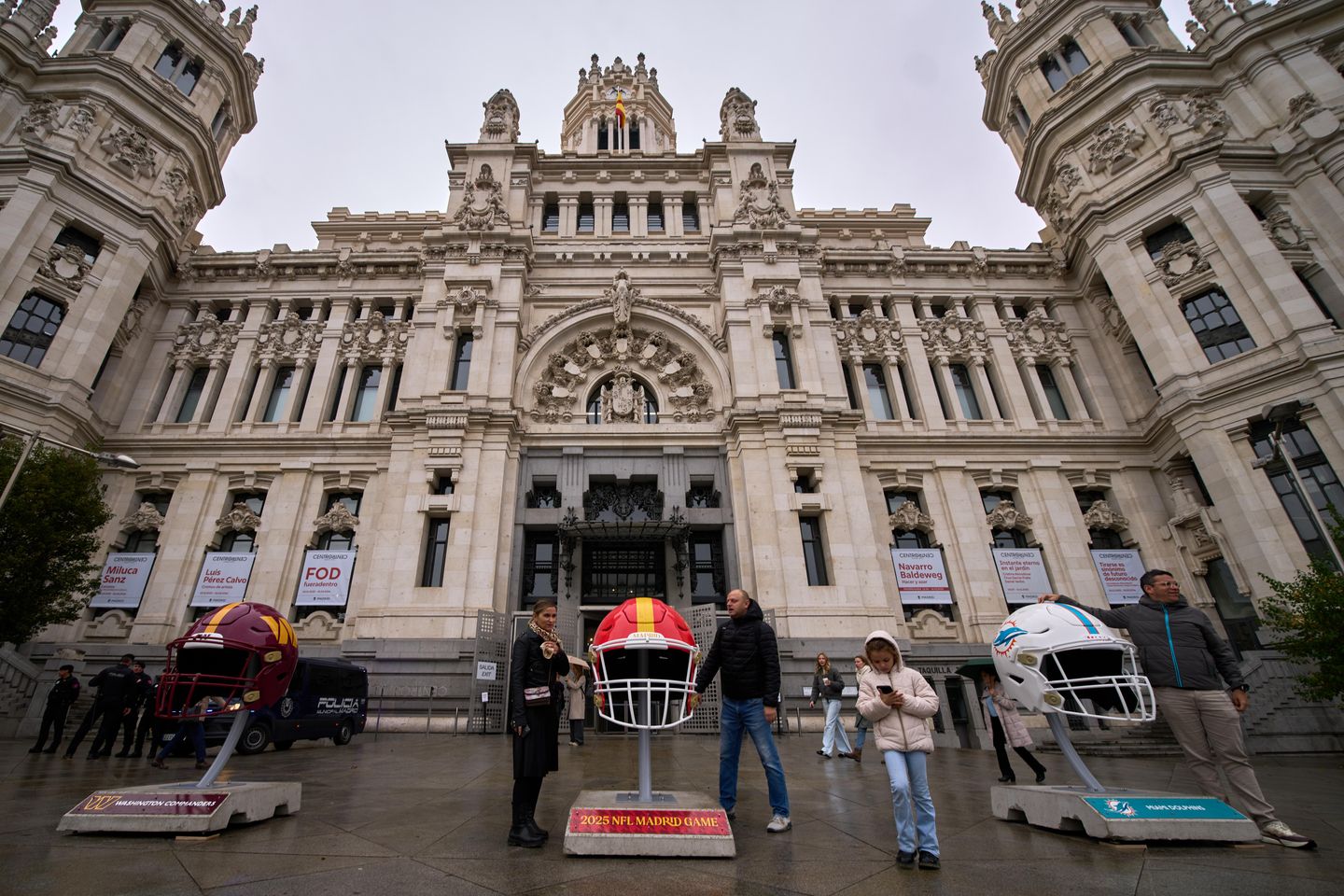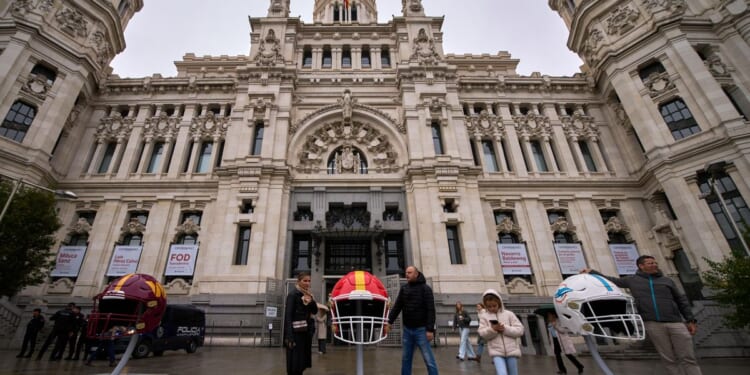
MADRID — Anti-tourist protests spiked across Europe earlier this year, from water gun assaults on cafe diners in Spain to the anti-Jeff Bezos protests in Italy and museum-staffing revolts in France. But since the end of the peak summer travel season, pressures have eased in many European hotspots, and in Madrid this weekend, thousands of American NFL fans on hand for the Washington Commanders-Miami Dolphins game were welcomed with open arms.
The festive atmosphere here contrasts with horror stories from both frustrated residents and anxious travelers from the summer.
Many locals in vacation destinations like Paris and Madrid have protested the annual waves of tourists from around the globe amid concerns that they are being driven out of their hometowns due to economies that caters too much to big-spending out-of-towners.The cold shoulder from locals, meanwhile, had some vacationers second-guessing their holiday choices.
“Some Americans have been afraid to go to Barcelona because they thought they were going to be shot with a water pistol,” Mark Meader, vice president of the American Society of Travel Advisors, said at a recent summit, according to reports.
Locals in Barcelona erlier this year drenched groups of tourists with water guns and chanted that they wanted their city back. Residents blamed tourism for skyrocketing rents, congestion and the erosion of the city’s identity. Paris and Venice saw similar conflicts.
Workers at the Louvre, the world’s most-visited museum, threatened to strike after they were “overwhelmed” by the number of foreigners.
Misbehaving tourists, like a couple from the United Kingdom who were barred from Venice for 48 hours for swimming in a canal, haven’t helped matters. Venetian officials said they have fined more than 1,100 visitors for similar behavior since the start of the year.
But the visitors themselves aren’t typically the problem.
One representative from the Neighborhood Assembly for Tourism Degrowth in Spain told The Washington Times that they aren’t “anti-tourism,” but “anti-touristification.”
There were no major anti-tourism clashes in Madrid over the weekend, even as the city saw thousands of American tourists who clogged bike lanes on foot and shouted at each other from across crowded streets.
The wedding of billionaire Jeff Bezos didn’t draw protests because of an influx of A-list celebrities who didn’t respect the local culture, residents said. The locals were instead frustrated by the effect that tourism has had on their quality of life.
“It’s gotten so bad that residents must wait in line even at the grocery store; we can’t take our dogs for a walk without running into four tour groups,” Sara Antonelli, part of the “No Space for Bezos” protest in Venice, told The Times.
Venice hosts 50,000 year-round residents. It saw 20 million tourists last year and is expected to surpass that total in 2025.
“We’re a small city, and we already have more tourists than we can handle,” Ms. Antonelli said. “The last thing we need is for Venice to become a place for destination weddings for multi-billionaires.”
Protests throughout the summer featured signs like “Tourism is stealing from us” and “Leave us alone,” but they didn’t fully explain the situation.
Many European vacation destinations are mired in an ongoing housing crisis that has been exacerbated by short-term rentals like Airbnb. Spain witnessed a 25% growth in the number of rental listings over the last two years, according to a report from Exceltur, a tourism lobbying group.
The price of homes has become untenable for many residents in these areas.
“Tourism is driving us out of our homes, villages and neighborhoods,” the Spanish protest group Less Tourism, More Life wrote on its website ahead of a June protest.
Many locals have further expressed concerns about the looming encroachment of a global “monoculture, as the unique character of cities like Madrid and Barcelona is stripped away and transformed into something more familiar and palatable for tourists.
They worry about grocery stores being replaced with ice cream shops and hole-in-the-wall favorites becoming chain restaurants.
“It is combined with the gradual loss and displacement of other social and economic activities,” said Angelos Varvarousis, an urban planning expert who splits time between Athens and Barcelona.
But, as the summer vacation season wound down, so did the protests. In Madrid’s case, it helped that the vast majority of fans attending Sunday’s NFL game were European. The league said only 10% of attendees — about 8,000 people — traveled to the game from the U.S..
The rest of the spectators were local to the region. The glitzy, global-minded NFL has also been establishing a footprint in Spain over the past 12 months, setting up a full-time office in Madrid and hosting several community events in the region.
The league said it heard no concerns from locals over its presence in the Spanish capital.
At the same time, several European countries have spent the summer brainstorming strategies to address tourism concerns.
Icelandic lawmakers announced this month that they are planning on a “considerably” higher tourism tax to offset the effects of visitors.
“The sector is a success story and the authorities want to have a bigger share of the value added,” Jóhann Viðar Ívarsson, an analyst on the Icelandic tourism board, told Euronews. The country currently collects a $4.76 nightly tax on hotel rooms and a $7.93 charge for cruise ship passengers at Icelandic ports.
In Spain, the federal government has required all short-term rental owners to register in a database. The country then ordered Airbnb to remove more than 60,000 listings that failed to cooperate in May.
Local legislators have pursued even more drastic restrictions. Madrid has stopped offering licenses for short-term rentals and increased fines for those who rent out their homes without the proper paperwork — fees could reach upwards of $100,000.
Officials in Barcelona plan to completely eliminate short-term rentals, including current properties with accurate paperwork, by 2028.
Concerned property owners have pointed out that many European nations rely on tourism dollars to drive their economies. The industry represented at least 10% of the 2024 gross domestic product in Portugal, Spain, France, Italy and Greece.
It wasn’t long ago that many cities that dependent on tourism suffered amid the dramatic drop-off in the wake of the COVID-19 pandemic.
Barcelona, Prague, Amsterdam and Athens all reported tourism losses of at least 80% in 2020, revealing their economies’ vulnerability. The industry has rebounded, but many European restaurants and hotels that closed during the pandemic never reopened.
“Without tourism, we realized how much of our economy depended on it,” Barcelona Deputy Mayor Janet Sanz said in 2020.
Now an opposition political figure in Spain, Ms. Sanz has been a vocal advocate of policies to help diversify the city’s economy. More Spaniards are joining the cause.
“We are reaching our limit,” said Jordi Valls, the government official who oversees tourism in Barcelona.
This article is based in part on wire service reports.








![Trump, Hegseth to Get Troops Paid Despite Dems Voting Against it Eight Times [WATCH]](https://www.right2024.com/wp-content/uploads/2025/10/Trump-Hegseth-to-Get-Troops-Paid-Despite-Dems-Voting-Against-350x250.jpg)








